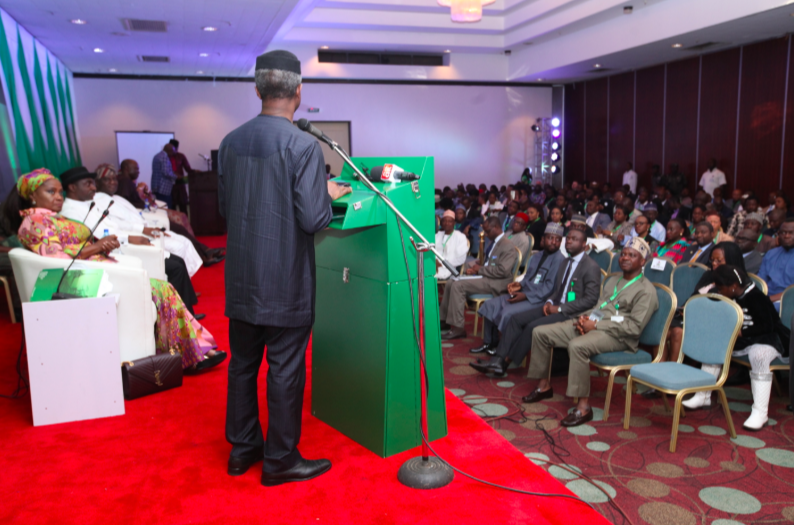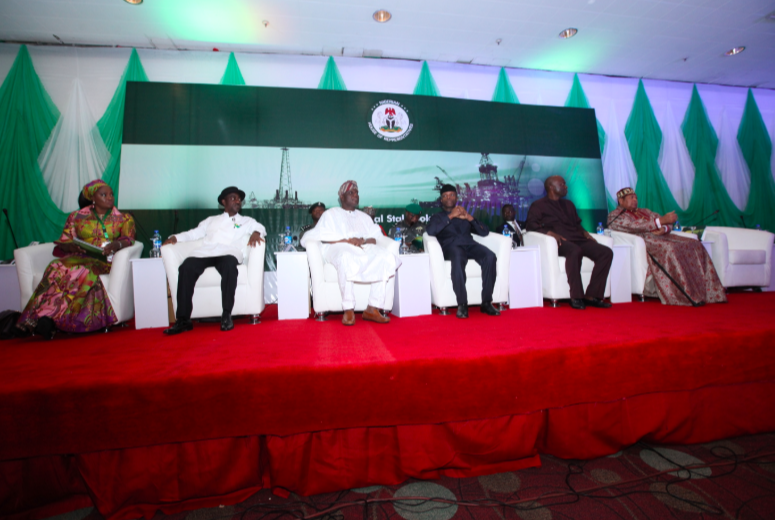National Stakeholders’ Summit On Legislative Framework For Petroleum Industry Reform
REMARKS BY HIS EXCELLENCY, PROF. YEMI OSINBAJO, SAN, GCON, AT THE NATIONAL STAKEHOLDERS’ SUMMIT ON LEGISLATIVE FRAMEWORK FOR PETROLEUM INDUSTRY REFORM ABUJA ON 20TH OF JULY, 2016
I want to congratulate the House of Representatives, and the private sector organizers of this event, for doing what I believe is the right thing to do, not just to the oil and gas industry, but all aspects of our national life; opening up the space for debate, and contributions from everyone. Nigeria is a very active country, and everywhere you go, you find that Nigerians make contributions, even when it’s not their business. So, when it is our business, you can imagine how interested we are, and why we need to be heard.
Besides, we are probably one of the most well educated and best-informed people on the face of the earth. I say this with all seriousness, everywhere I have been, you will find that the quality of contributions by Nigerians is always very high, and it is because we are very well educated, we are very well informed. But sometimes, that also gives us a great deal of problems, because, we are sometimes into what they call “analysis paralysis.” After analyzing and presenting several papers and documents, getting things done sometimes is a challenge. So, I hope that this is going to be much different, and a lot of that will depend not just on the National Assembly and the Federal Government, but also on all the stakeholders, who will keep everyone honest and hold everyone to account.
So, I will like to thank again the House of Representatives led of course by the speaker, and the deputy speaker for this very great opportunity to contribute to the debate. I cannot, of course, touch all the points that have been made. We have been told that the government will get a summary of all that have been said here. But I also know that you had an interaction with the Honourable Minister of State for Petroleum Resources, and I have also had the benefit of conversation with him, and taken a look at his presentation. So, I won’t go over the various things he had already mentioned, because that will certainly be a waste of time.
But, I want to say that it’s important for us to do something very quick about Petroleum Industry Legislation. The form that that will take, of course, is what we are hoping we can fashion. The proposal of government is to have three pieces of legislation that hopefully will cover the ground. And I’m sure that the Minister had already mentioned the proposals to have the Petroleum Industry Reform Bill, which will deal with governance and regulatory issues for upstream, midstream and downstream, not just for oil, but also for gas.
Then, the Petroleum Fiscal Reform Bill which would address fiscal reform in all its ramifications. Then, the Petroleum Revenue Management Bill which addresses the utilization of petroleum revenue. Now, I am fascinated by the idea of a Host Community Bill as a separate Bill. And I think that even from the point of view of signalling, that would be important. Because, clearly there is a lot of agitation especially around the treatment of host communities; environmental issues, issues of what host communities are entitled to or not entitled to, will probably be dealt with. I think it’s wise to deal with it in legislation. If that legislation can be stand-alone legislation, then clearly that would be a good development indeed.
But it is not about passing legislation, I think that it is very important, that we bear in mind that legislation by itself doesn’t resolve many of the problems that we experience. A lot of our problems are related to corruption; lack of transparency. If you look at the problems in the oil industry, a lot of opacity, I mean it’s just one of the opaquest industries that you will ever find. The more you look as they say, the less you see, and I think that we really need to open up the industry and enable it to function in a transparent manner so that, everyone can contribute to what is going on and understand it better.
In my view, legislation must address questions of discretion; ministerial discretion in particular. So that we are able to put things through a transparent process, open things for allocations or whatever kind, and that in implementation, the main issues of governance are addressed. I think that if we look at what has happened so far, you will find that the NNPC, and of course the various agencies under it, have just over the years, acquired a terrible reputation for just being opaque and for their systems not been run properly.
Some of that have to do with the fact that it is government. Frankly, my belief is that we must take a look at how to as much as possible, ensure that government plays less and less a role aside from its purely regulatory function. I believe that what should happen is that we should have a regulatory body which would address questions of regulation and look over-regulation.
But in most other aspects, we really should allow the private sector to take preeminence because in my view, if you don’t de-emphasize government especially in industry or business, you’re going to keep having some of the problems, especially, the problems of corruption that you find, because there ought be, I mean those who are involved in business, ought to have stake in ensuring that profit is made, and ensuring that businesses are run efficiently.
Unfortunately, that’s not the case where government runs a business. Efficiency isn’t usually a priority, and of course, profit sometimes is sacrificed on the altar of political necessity, and all other considerations. I believe that we must move towards transparency and also, we must not be afraid, we must not be shy of holding people to account for what has gone wrong in the industry. I think we must be open in ensuring that we hold people to account for what has gone wrong so that in the future, people don’t do the same things.
The other point which I noted is the agitation of the host communities. And of course, I’m sure that has come up several times, it’s come up here very frequently also. Again, we must not be shy of holding leadership responsible; leadership in the host communities, leadership in the States, leadership everywhere, over the years, responsible for some of the huge amount of money that has gone into the oil-producing areas and do not appear to have made any impact at all.
Anyone who goes to the Niger-Delta today, does not see a place where you can say that the billions of naira that had been allocated in various forms; either through state allocations, NDDC allocations, special levies, and all sorts of things, if you look at that place, you just don’t get the sense that anything has been spent there. It is just wasteland and I think that we must be able to say and hold leadership accountable. It’s okay for us to talk in the air about “do something for this, or do something for that”, but billions have gone literally into the swamps in the Niger-Delta. I think it is important for us to be able to say that some people must be held responsible for this kind of conduct.
Otherwise, no matter how nice the legislation, no matter what you say about what host communities are entitled to, some people will make away with most of it, and we will be back to where we are today in very short order. Unless, we are able to put in place a system whereby we hold our leaders to account, whether they are local, state, or federal leaders, we hold them to account. And we say you must show us what you’ve done with the resources that you have already. I believe that we must work very quickly indeed.
The Ogoni cleanup – there is a work plan and of course, I’m sure many of us are following up with the UNEP and the Ministry of Environment. There is a work plan which has been developed, and we’re hoping that we will be able to follow through with that.
Some of the instability in the Delta at the movement is, of course, not helping our plans to begin the clean-up. Already we have the commitment for a billion dollars which is ready to fund the work plan. At least there is commitment for that amount of money. I know that the project coordinator is about to be appointed. That, has already been advertised, there’s a Board of Trustees and governing council. And the clean-up, I believe can start very quickly. I don’t think that it’s necessarily going to be held up by further bureaucracies, but I think that one of the critical things is that we must recognize that this is not going to be a few days or a few years. The programme is meant to be; a programme that extend to about 30 years in all. So, it’s bound to be a fairly long programme. But I think the important thing is to start with that project and to move on very quickly thereafter.
Finally, I just want to say that we must take the opportunity that we have today, to not only pass legislation but to put in place systems whereby we are able to maximize our oil and gas resources. Oil and gas resources will not be as priced as they are today, and if you are following world trends, you will find that there is an increasing de-emphasis. We’ve lost most of our markets in America because of shale oil. Of course, you know that America was one of our primary importers of our oil. But now, shale has more or less taken over. And with the increasing sophistication in productions, it may well be that shale oil might even become more problematic. What is more, I mean some of our best importers, for instance, Asia, many of them are developing alternatives to fuel. For instance, if you look at Japan, Japan today has more car charging stations, than fuel stations. So, they’re using more electric cars. And gradually, in fact, if you look at some other figures by 2030 thereabouts, many of these countries China, and Japan, will be doing so much in terms of electric cars.
As a matter of fact, now, they’re giving subsidies to those who are buying electric cars and giving subsidies to producers of electric cars. So, there’s obviously a strategy on the part of the Asian countries to which we export at the moment, to de-emphasize the use of oil and gas. And we’re not going to be in the same situation as we were 10 years ago. If we don’t get moving quickly and organize ourselves quickly, then we are going to find ourselves in a very short while, holding on to very much oil, that may not be of much value, as it is today. The next few years are going to be very critical in being able to maximize what we can from our oil resources.
The final thing is with respect to the collaboration between the Federal Government and the Legislature. Of course, I think it was mentioned that the first PIB was killed on the account of the suspicions between the Federal Government and Legislature, and the various problems associated with that. But I want to say that we are committed, the Federal Government is committed to working with the National Assembly to ensure that this particular set of Petroleum Industry Legislation, are passed in good time. And our party will certainly have no hidden agenda, and I can assure you that we’re all for ensuring that we have good pieces of legislation, and we certainly hold ourselves responsible for ensuring that we are quick to produce all that is required and that these legislations are passed and I pray they are passed within the shortest possible time, if possible, by the end of the year we can get all of that done.
Thank you very much.






